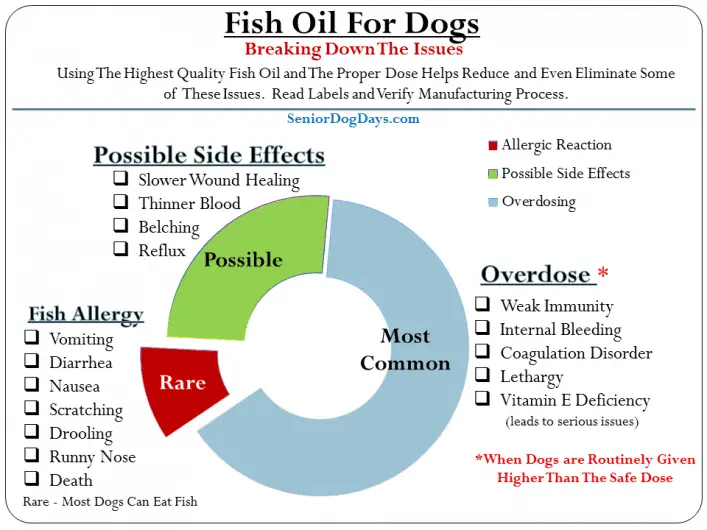Some content may contain affiliate links to products which means we could earn a fee on your purchase. Thank you for visiting
You’ve likely already done research and know there are benefits of giving our senior dogs the essential fatty acid – Omega 3 and are wondering if there are any side effects for giving dogs these omega-3’s through fish oil.
Are there Fish Oil Side Effects for dogs? Yes research supports that Fish Oil in Dogs can cause a thinning of the blood. This is especially pronounced when a dog is already on medications with similar side effects. In addition to Side Effects, dogs can be allergic to manufactures additives and overdosing brings special concerns.
Here is a chart for identifying at a glance: Fish Oil For Dogs Side Effects Vs. Allergic Reactions Vs,. Overdosing. You may print this out for at-home personal use.

Aside from possible side effects of supplementing your dog with fish oil, we’ll talk about allergic responses and overdosing, which is a result of giving your dog TOO much fish oil for her body weight and for a period of time.
But before we get into the problems of fish oil, let’s just briefly touch upon why owners even bother with fish oil to begin with..
Reason for Supplementing a Dog’s Omega-3
I would guess that the majority of dog owners get turned onto fish oil because their older, senior dog has a skin problem, allergies, or is dealing with some stage of arthritis. Though fish oil could also be used for kidney function, cognitive function and heart disease; skin, allergies and arthritis seem to be what makes owners start looking for any relief that doesn’t involve prescription medicines. That’s why my senior dog gets it.
Fish oil is loaded with omega-3 fatty acids which research shows helps these conditions. We supplement omega-3 because it is essential to our dog’s diet, dog’s cannot make it in their own bodies and omega-3 cannot be adequately delivered in commercial food.
Why Omega’s Deteriorate in Food
Processing, oxygen, and heat can destroy omega-3 so even if omega-3 is added into a commercially available dog food recipe, by the time our dog’s food makes it to her dish; the added omega-3 might be gone. You’ve paid extra or were lured in by something that WAS there, but is no longer available when you feed it. That, to me, is one of the most disappointing things when I hear dog owners asking “what dog food has omega-3’s added?”
Enter Omega-3 Supplements and the popularity and discovery of fish oil for dogs, especially senior dogs suffering from arthritis.
The Problem with New Discoveries
Just because more and more veterinarians are recommending fish oil for dogs (all 3 of mine have recommended this supplement to help my senior dog’s arthritis) doesn’t mean they have all the answers.
For instance; each of my veterinarians gave a slightly different dosage, not by much, but slight. In fact, even a popular online veterinarian website gives a wide range in dosing: here is a snippet
…data suggests that a dose between 20-55mg combined EPA and DHA per pound of body weight is safe for dogs and cats.
That’s a huge dosing variance; the difference from low end to high end is more than double so I’m not surprised that my vets have differing dosing numbers.
But what concerns me even more is that when I try to get conclusive answers regarding side effects, complications, capsule material chemicals, what type of fish oil, etc.; they offer no specifics. I get it, they are not nutritionists and fish oil was probably not part of their curriculum.
That means we are left to do our own research on fish oil for dogs and possible side effects and, once again, rely on the success, and unfortunately the failures, of fellow dog owners who take the time to share experiences.
My Experience with Fish Oil
My senior dog is on an Omega-3 supplement called Captains Krill (product link)and it took me almost a year to find the right product, the right balance, the right dosage and the right additional supplement …yes, I supplement my dog’s diet with vitamin E as a result of supplementing him Omega-3 l, but we’ll get to that later.
So this is the article where I’m going to share my results so fellow senior dog owners like you can have one more weapon in the arsenal as you continue your own research.
Please remember, these results were specific to my senior dog and may not be right for your dog. Research begins with your veterinarian’s input. My senior dog is in between a large and giant breed, Husky, German Shepard, Boxer, Retriever mix. You can Check out his Dog DNA Story HERE.
He is 12 years old and about 90 pounds. He has arthritis in his spine, hips and also has hypothyroidism which is controlled with a tiny pill. He is very mobile for his age and I attribute that to early supplementation of human grade Glucosamine, Chondroitin and MSM (started at around age 6).
Fish Oil and Omega-3 for Dogs: The Confusion
So with every little helpful thing we do to make our senior dog’s feel better, move better, live a more pain-free life; we are left holding the bag to figure out side effects and whether or not side effects are worth the risks.
I am satisfied in my research that omega-3 helps my dog with arthritis. I see it with my eyes and though there is not a ton of research, there are a handful of publicly available case studies. I like the ones that are not sponsored by the pet industry. Here is a snippet of an independent study on fish oil in dogs:
Journal of Nutritional Science: An un-commissioned randomized, placebo-controlled double-blind study to test the effect of deep sea fish oil as a pain reliever for dogs suffering from canine Osteoarthritis.
When compared to corn oil (placebo), there was not a statistically significant benefit in using deep sea fish oil as a pain reliever in our study population of dogs suffering from osteoarthritis. However, when comparing baseline values to the study-end values within the group during the 16 week study, the fish oil treated patients improved significantly in many of our outcome variables indicating a true, but small, relief in pain symptoms.
During the same time there was nearly no effect within the placebo group. As other studies have shown a similar effect, we feel we can recommend fish oil e.g. for patients that cannot take NSAIDs or other analgesics for their OA (osteoarthritis)
Reported Problems with Omega-3 or Fish Oil for Dogs
I’ve spent hours, days and nights researching fish oil and Omega-3 for dogs, not just the side effects, but the manufacturing process and method of delivery such as; capsule, spray, pump or bottle.
Today, we are going to be talking about 3 things every dog parent should be concerned with when it comes to giving your dog fish oil or Omega-3. They are:
- Allergic Reactions to fish oil– Reactions your senior dog may suffer as a result of consuming fish oil when they are allergic to fish or they are allergic to ingredients that were added to the fish oil.
- Overdosing your dog with fish oil– Possible symptoms displayed by a senior dog that has regularly consumed a fish oil dosage (or added ingredients) that is too high for their system to handle.
- Fish Oil for Dogs Side Effects – Symptoms which could occur in a senior dog even when supplementing with Fish Oil as prescribed. Also included here are the possible side effects of any ingredients that are added to the fish oil.
These are the top 3 things that could go wrong when giving a dog fish oil or omega-3 supplements and we’ll talk about each one individually.. As we dive deeper into each of these categories, we’ll also talk about what many senior dog owners (myself included) are doing to prevent overdosing and reduce the possibility of side effects.
Let’s start with the rarest occurrence: A Dog’s Allergic Reaction to Fish Oil

Dog Having Allergic Reaction to Fish Oil
Allergic reactions can range from heavy drooling to full on medical emergency. If you’ve been giving your dog salmon, mackerel, sardines, shellfish etc., all his life, without issue, they likely do not have a fish allergy.
They may, however, be allergic to or aggravated by other additives in the fish oil like chemicals or extracts. Or, your dog may be allergic to the polymer capsule ingredients if that’s what you’re feeding.
There is More to the Pill Than Fish Oil
Because I’ve spent hours researching, my dog gets omega-3 capsules without added ingredients; just the oil. And when I look at the back of the bottle, the capsule ingredients are Gelatin (bovine), glycerin and purified water.
Now, to be honest, even though glycerin is considered safe in foods (to a point) and lots of dog foods and dog treats and chews have way more glycerin in them than these little capsules, I’m not 100% happy with giving glycerin to my dog. My dog is on a raw diet and I try hard NOT to give him these types of additives.
However, the benefit of giving my dog this particular omega-3 supplement (to me) far outweighs my aversion to this low amount of glycerin.
But when I compare the ingredients in the capsule I use for my dog to some other, very well-known brands, their capsule ingredients look like this: click page 2 below

